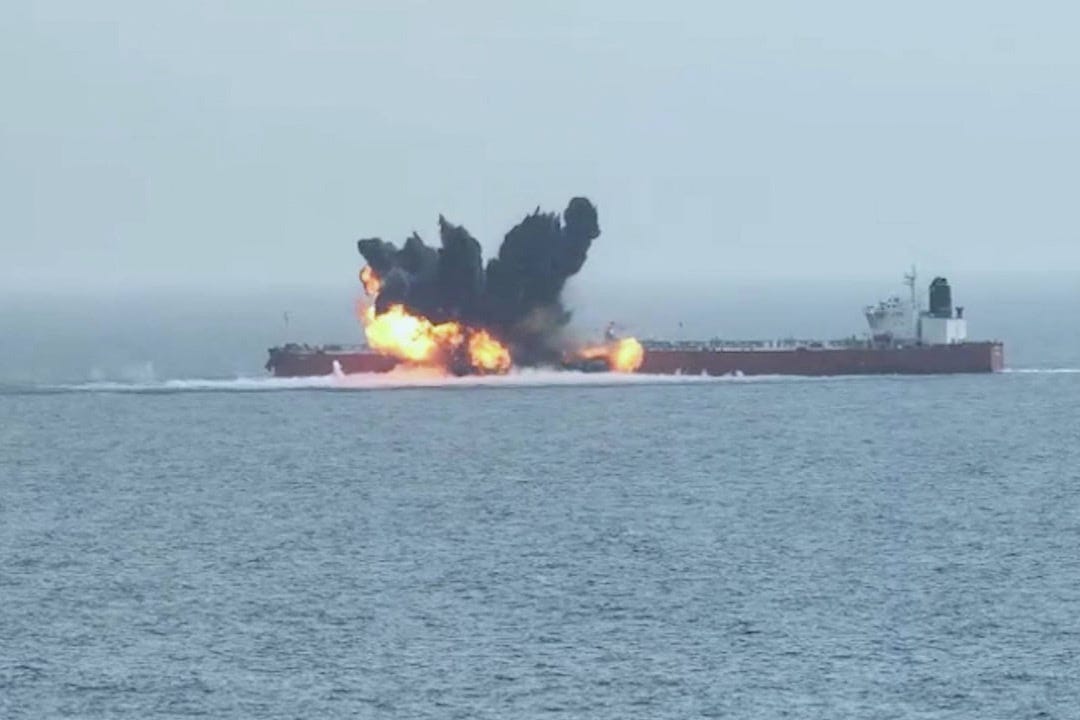Today, the Wall Street Journal ran a piece on Russia providing satellite data to the Houthis (Ansar Allah) via Islamic Revolutionary Guard Corps (IRGC) in Yemen.
“The Houthis, which began their attacks late last year over the Gaza war, eventually began using Russian satellite data as they expanded their strikes, said a person familiar with the matter and two European defense officials. The data was passed through members of Iran’s Islamic Revolutionary Guard Corps, who were embedded with the Houthis in Yemen, one of the people said.”
For me, I am most interested in what kind of satellite data - this could be anything from meteorological data to monitoring the movement of ships. My initial reaction was “Russia is giving them targets so their ships won’t be attacked.” The article wasn’t explicit on the data Russia provided and there are more knowledgeable experts who probably have a better comprehension on the technical aspects. For me, I’m more interested and better equipped to talk about the Russia-Iran angle on the Houthis and broader cooperation on satellite data.
The WSJ article does suggest that the IRGC is really assuming the role as the accelerator of Russia’s ties the Houthis in Yemen. While Russia’s intelligence services, including the SVR and GRU, do maintain some independent ties with the Houthis, the IRGC appears to be significantly enhancing the coordination between Russia and the Houthis. It’s likely both the Quds and Aerospace Forces involved in it, especially given the recent reports about Russia’s potential cruise missile deliveries to the Houthis - this isn’t just a Quds Force operation, IRGC Aerospace Force is likely involved as well.
More broadly, this tangentially brings me back to some of my suspicions about Russia’s possible support for Iran’s April and October attacks on Israel - big caveat here because this hasn’t been confirmed. I’ve been thinking about this for the past six months and thought I’d flush out some ideas about Russia’s potential - although unconfirmed - support for Iranian strikes on Israel. We already know that some Iranian missiles (Fateh family) are using GLONASS, basically Russian GPS, to enhance missile guidance. My question is what was the level of indirect Russian involvement in Iran’s strikes on Israel? And, if Russians are providing the IRGC with satellite data to support the Houthis, does this give us any indication about Russia’s support with Iranian targeting in April and October?
I want to go back to 2020 - the last time when a war was looming with Iran. After nearly a year of tankers being seized and attacks on oil infrastructure, Iran’s most prominent military commander with his own cult of personality was killed in a targeted drone assassination.
In January 2020, Iran launched a series of ballistic missile strikes against two Iraqi bases housing U.S. and coalition forces—Ain al-Asad airbase in Anbar province and a base in Erbil. The retaliation primarily involved Fateh-313 and Qiam-1 ballistic missiles (the Qiam was likely used in the April and October attacks, it’s an older liquid propellant vs the Fateh-313, part of the Fateh family of solid propellants). Anyway, some Russian military official apparently indicated to an Israeli publication that the Iranians used GLONASS satellite navigation system to enhance the accuracy of its missile strikes. GLONASS, Russia’s alternative to GPS, is not subject to U.S. control, and Iran theoretically could have used it as a backup or primary system for missile guidance. However, at the time, Russian military experts were skeptical about how reliably Iran could use GLONASS. Mostly because its functionality would likely be hindered by countermeasures like jamming or signal interference, especially in an active conflict zone. Plus it would also mean that Russia was willing to provide Iran with this data and, at the time, that would have been an escalation. The times have changed, of course. We now know that systems like the Fath-360 use GLONASS and likely there has been more efforts to integrate Iranian missiles/UAVs since the war in Ukraine. Caveat is that for Iran to access the military-grade version of GLONASS, Russia would have to provide cryptographic keys, which would enable Iran to use the encrypted signals designed for enhanced accuracy and protection against jamming. But, to be determined, because Russia would be more vulnerable by allowing Iran - a country deeply penetrated by Israeli and US intelligence - into a highly secured network.
In general, Russian support with targeting and guidance of Iranian missiles is something to look out for. Also Russian support for improving the accuracy of Iran’s longer range missiles but that’s a topic for another post.
TLDR: The ties between Russia and Iran have only strengthened since the 2020 attacks, and as today’s WSJl report indicates, Russia is now openly providing satellite data to groups like the Houthis in Yemen through the IRGC. This raises important questions about whether Russia could be offering similar support for Iran’s missile activities elsewhere, even if it remains officially unconfirmed.





This is a very interesting development. Thanks for your perspective on the potential implications, Nicole.
The word “experts” is repeated twice consecutively, and the following is a run on sentence: “ Also Russian support for improving the accuracy of Iran’s longer range missiles but that’s a topic for another post.”